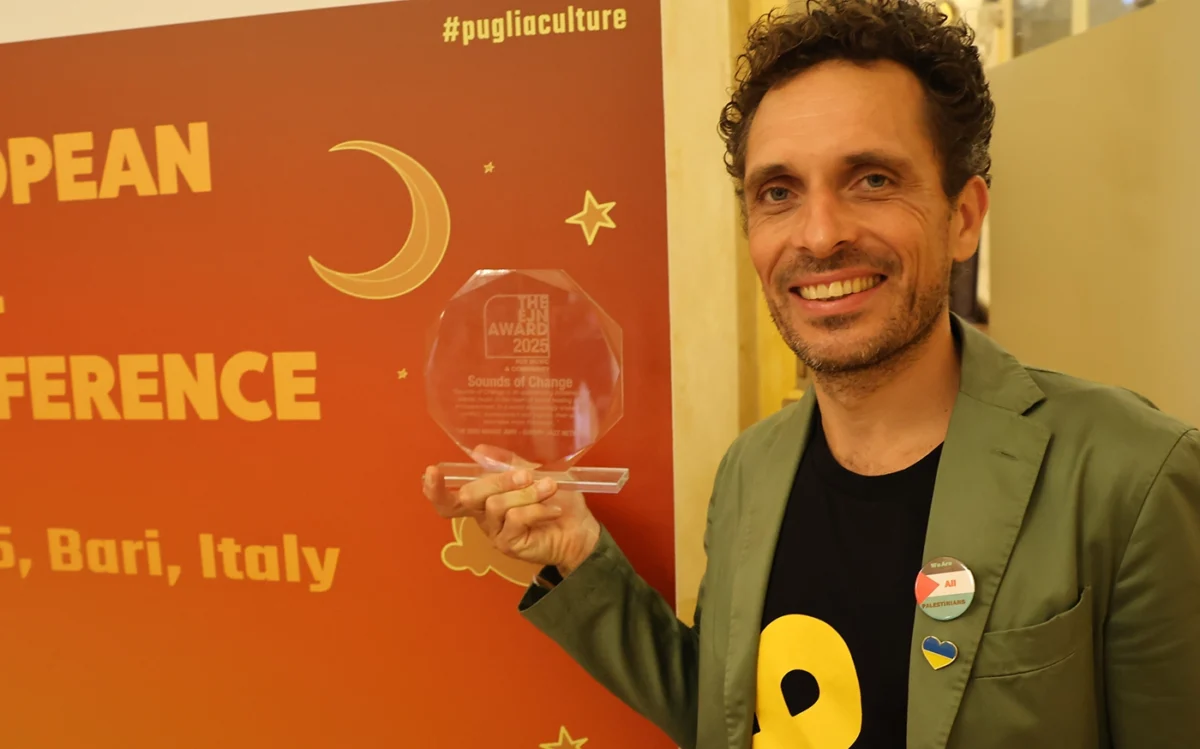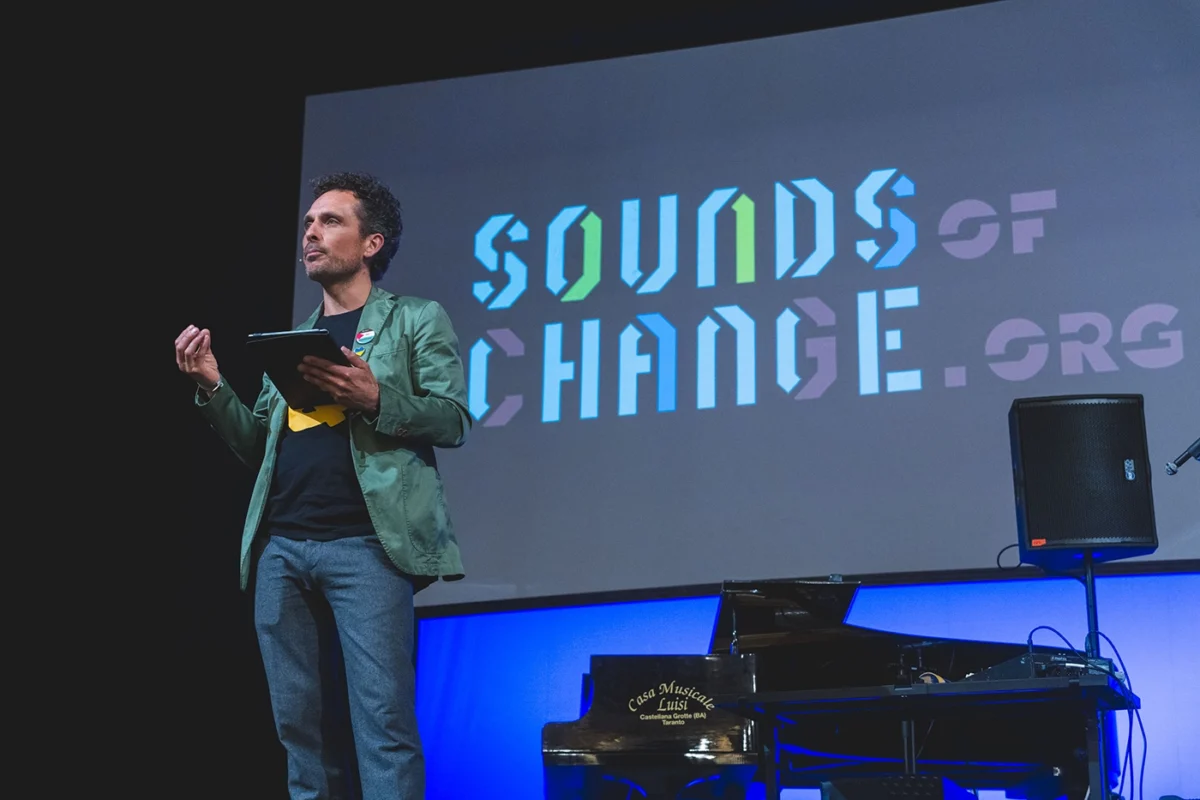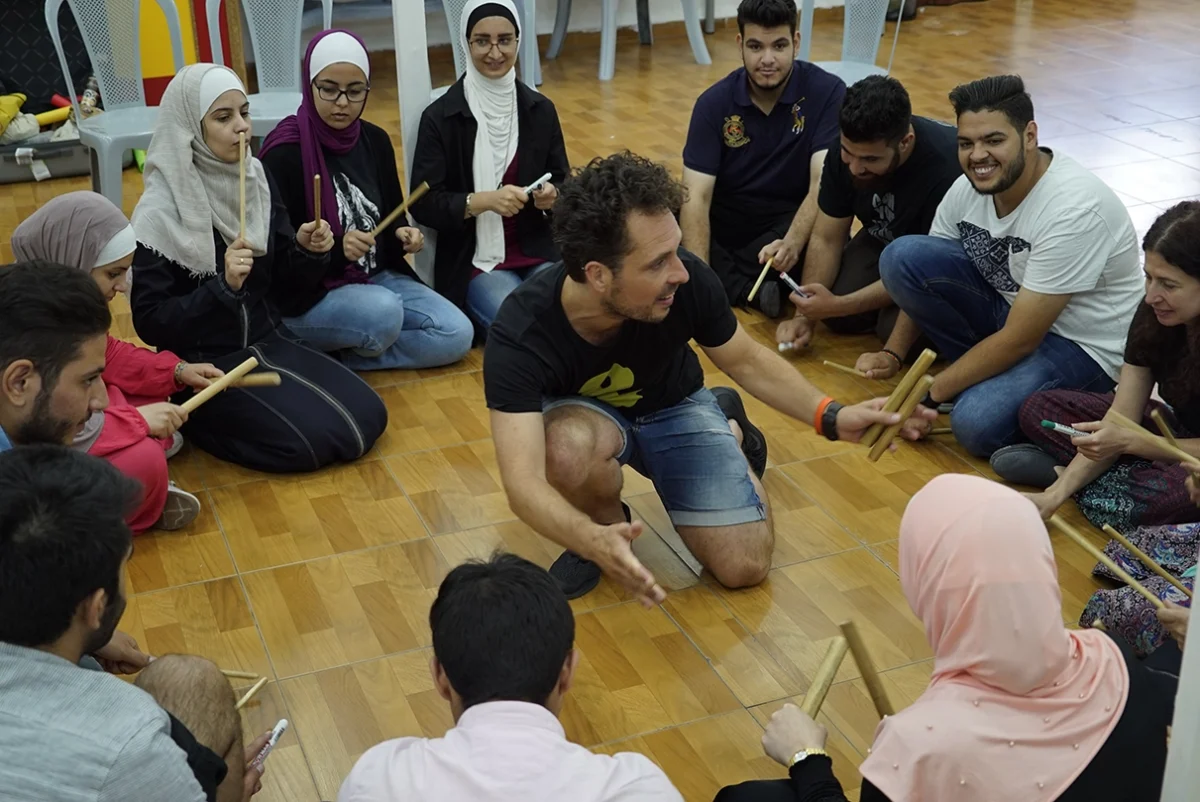Sounds of Change receives the 2025 EJN Award for Music & Community
Interview with Lucas Dols

Music is a force for change
On improvisation
Training the trainers
Current projects
Improvisation may lead you down unfamiliar and unexpected paths. This is something that Dutch jazz bassist Lucas Dols has experienced in full since his visit to a refugee camp in Jordan in 2012. Last weekend, during the European Jazz Conference, the 2025 EJN Award for Music & Community was presented to Sounds of Change, the organization Lucas founded in 2017. As stated on their website, Sounds of Change trains (local) professionals to use the power of music in their work with different, often traumatized focus groups throughout the world. Today, Sounds of Change is active in Lebanon, Palestine, Jordan, Ukraine, Iraq, Syria, Turkey, and the United Kingdom.
About Lucas Dols
Lucas Dols has been an active member of the Dutch jazz scene for almost three decades. His own quartet today is called DYAR and consists of Lucas, Nawras Altaky (oud/vocals), Ghaeth Almaghoot (clarinet) and Modar Salama (percussion). ‘Dyar means home or house in Arabic. We play traditional Syrian and Dutch repertoire, but also Nawras and Ghaeth’s own work.’
He also plays in the band of Syrian singer/composer Wasim Arslan and in Kitchen Stories, the collaborative project between Martin Fondse and Jawa Manla. Lucas is working with Janne Schra on a follow-up to the success of Janne en de Vogels from 2022.
From EJN’s Jury Statement: “The 2025 EJN Award for Music & Community is presented to Sounds of Change (Netherlands), an outstanding initiative that places music at the heart of social healing and empowerment. In a world increasingly shaken by conflict, displacement and trauma, their work resonates more than ever. Through a clear, structured methodology, they train teachers, aid workers and psychologists to use music as a tool for connection, expression, and recovery-especially with young people and communities affected by crises. Active across all over the Middle East, Ukraine and the Netherlands, Sounds of Change has grown into a far-reaching and deeply rooted project, creating safe and inclusive spaces where music becomes a language of resilience and hope. The jury recognises the project’s scale, consistency, and long-term vision, and celebrates its unwavering belief in music’s ability to restore humanity where it is most at risk.”
Music is a force for change
Below is an elaboration by Lucas Dols on his acceptance speech, as delivered at the European Jazz Conference in Bari (IT), on Saturday 27 September.
‘It is a great honour to receive the Community & Music Award from the European Jazz Network. For me, this confirms something I deeply believe: music is not just art – it is a force for change, healing and connection.’
‘My journey began in jazz. For years, the stage was my home. While studying at the Amsterdam Conservatory, I played in bands and projects that were successful both nationally and internationally, which gave me the opportunity to play at many beautiful venues and festivals and visit many different countries. I played with Room Eleven, Tin Men & the Telephone and various jazz musicians such as Hans Dulfer, Benjamin Herman and Yuri Honing, as well as theatre groups such as Orkater and Matzer. I also created several performances with actor Bram van der Vlugt.’
‘But somewhere in the back of my mind, there was always a little voice searching for more meaning and impact. Especially when the war in Syria started, I felt powerless and frustrated. I remember thinking: if only I had become a doctor, then I could have joined Doctors Without Borders. In 2012, I ended up with a group of musicians in the Zaatari refugee camp in Jordan, where 140,000 people were staying at the tim. Sand, chaos, not enough food, water, heat, the war nearby. I saw how children found joy and autonomy again through simple clapping and singing. That moment changed my life. From then on, I decided to not only play music on stage, but to use music more as a means of recovery, connection, expression and, in some cases, healing.’
‘It took me years to find the right form. I attended business school, worked for Musicians without Borders for two years, and did a campaign project for Amnesty International. Finally, in 2017, I founded Sounds of Change. It was a huge success: a large benefit concert in Paradiso in Amsterdam kicked things off. With 1,500 visitors, it was sold out, a moving and heart-warming evening.
‘Making music in a group teaches us to listen to each other better and creates connection and security. It brings energy, fun and joy, even in the most difficult circumstances.’
‘With Sounds of Change, we now train teachers, psychologists, social workers and sometimes even musicians to use music as a psychosocial tool in their work with various (traumatised) target groups, especially in conflict and war zones. We work with local professionals because they know the language, culture and context – and can therefore make a lasting impact. Music speaks where words fail or language is a barrier. It is an expression of culture and identity, and can offer a sense of security. By improvising and composing music together, people regain a sense of control. Making music in a group teaches us to listen to each other better and creates connection and security. It brings energy, fun and joy, even in the most difficult circumstances.’

On improvisation
We asked Lucas some additional questions right after the conference.
Being a musician yourself, jazz and improvisation are deeply ingrained in your life.
‘Improvisation has shaped me: I am used to being flexible, looking for opportunities and responding to the unexpected. These tools have not only helped me on stage with other musicians, but also outside of it. In teaching children, in facilitating workshops for groups – whether children or adults.
‘Improvisation and flexibility are also key elements in our work with Sounds of Change, where we train aid workers. Because that is exactly what you need when you work in chaotic and unpredictable environments, such as refugee camps. You may have a plan that you made the day before, but there is a good chance that things will turn out differently in practice. Then you have to be able to switch gears in the moment. It’s not about executing exactly what you’ve prepared, but about what you can do for the other person. That’s why we train people to have many tools at their disposal and to look at the bigger picture, to have many different tools: from music, art, theatre or dialogue. The more ways you have to adapt, the better you can connect with the situation and the needs of the target group. Whether that’s in a classroom in the United Kingdom or in a chaotic environment such as a refugee camp.
‘When we make music with vulnerable target groups, improvising together plays a special role. With improvisation, there is no value judgement yet. Unlike traditional music lessons, where right and wrong are often central, improvisation gives everyone the space to participate without being judged.’
‘When we make music with vulnerable target groups, improvising together plays a special role. With improvisation, there is no value judgement yet: you don’t know what’s going to happen, and that makes it open, equal and playful. Unlike traditional music lessons, where right and wrong are often central, improvisation gives everyone the space to participate without being judged. Improvisation also offers autonomy. By composing and improvising together, you give people ownership of the process. Their choices matter, and those choices are respected. That gives them strength and recognition. And that is precisely what is crucial in trauma-sensitive work: giving back control. People who are traumatised have often experienced a great loss of control. They live in circumstances – whether in a refugee camp, prison or disadvantaged neighbourhood – where their freedom is restricted. By giving them back a bit of autonomy through music and art, people feel again: I matter, my voice is important. That realisation, however small it may seem, can be an enormously valuable element in the recovery and resilience of vulnerable target groups.’
Training the trainers
How much do you have to write or talk or do before you reach the people you want to help?
‘We mainly work in collaboration with local partner organisations. We train their teams of aid workers, teachers, psychologists or community workers. In the past, we have trained teams from Warchild, Welthunger Hilfe and Norwegian People’s Aid, among others. So we establish contact with our trainees through them, and indirectly also with the target groups they work with. In some countries, we have also trained local trainers who independently provide training with one of our team members from the Netherlands. We have already trained trainers in Jordan, Palestine (the West Bank), Syria and Ukraine. This is also a sustainable way of working, as it means we fly less and give them more responsibility. But it is also a more logical way of working, because the local trainers (as well as the local partner organisations we work with) know the culture, language and context best.’
Does anything ever go wrong?
‘Certainly. For example, we once found out after training a team of employees from a partner organisation that the organisation’s subsidy had been withdrawn. This suddenly reduced the (indirect) impact of our training considerably. About eight years ago, I also experienced a situation where we started a training week and noticed that people had completely different expectations. What we had come to offer was not at all what they expected and turned out to be a poor match. We still spent three days making music with the group, composing music and having fun. But we had to adjust our expectations considerably. In recent years, we have mainly been working with reliable and somewhat larger partner organisations, which means we no longer encounter these kinds of situations.’
How does a relief effort start? With you? Or is there a request for help first?
‘It always starts with a request for help from an organisation. We have a fairly large, specialised network. As soon as there is a request for help, we start discussions, make a plan, find the right funding, match it with our freelance trainers and start the planning phase.’

Current projects
Can you point out what Sounds of Change is currently working on?
‘This year, we are working in Ukraine, north-eastern Syria, Lebanon, Jordan, and Palestine (Gaza and the West Bank). In Ukraine, last June, we trained 60 teachers from 60 different schools in the Zakarpattia region to use music in a trauma-sensitive way in the classroom. This December, we will return to train a select group of these teachers to become trainers, so that they can pass on the knowledge and tools to their colleagues. We are doing this project in collaboration with the regional mental health services in Ukraine.
‘In north-eastern Syria, we are working with an NGO and their partner organisations. They are active in the field of deradicalisation and psychosocial support for victims of IS. We are training the team members of the organisations working there to add music to their working methods and toolkit in a trauma-sensitive way.
‘In Lebanon, Jordan and Palestine, we are training a total of 75 aid workers from various partner organisations on location over a period of two years. Ultimately, some of the people we train there will also become trainers themselves, so that they can pass the knowledge on to their colleagues and strengthen their communities. Since April, we have also been giving webinars in Lebanon, Jordan and Palestine on trauma-sensitive support, trauma theory and the use of various techniques from music, art, theatre and dialogue that can contribute to psychosocial support. In the training courses in which we delve deeply into trauma – which is the case in all projects in the Middle East – we work together with a Dutch trauma expertise organisation called Trauma International.’
Website: soundofchange.org
Text by Mark van Schaick
Photos by Mark van Schaick, Puglia Sounds and Sounds of Change